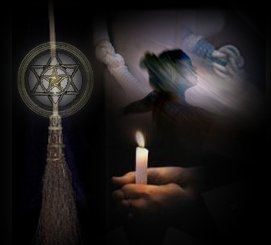 אתהפכא חשוכא לנהורא
אתהפכא חשוכא לנהוראSelah.
To seal a spell [1], witches say "so mote it be," meaning "it is so." In a similar manner, Jews seal prayer spells with the words amen (אמן) or selah (סלה). In the Temple, in place of amen, the words [2] are said:
Blessed be His Glorious Majesty forever and ever.
ברוך שם כבוד מלכותו לעולם ועד
The witch's "so mote it be" and "amen" mean the same thing. This seal reinforces Divine Will with the soul power of emunah (interincluded within all levels of one's soul) and kavanah to make the prayer spell manifest. It is a formula of confirmation and agreement. By pronouncing "so mote it be" and "amen" one becomes bound to that uttered. One doesn't say either "so mote it be" or "amen" in vain or with evil intent. It is a serious utterance of creation-making for which one is held accountable.
Selah is an untranslatable term found 71 times in Tehillim (Psalms) and 3 times in Habakkuk [3]. Interpreted as a musical or liturgical sign, it implies raising, lifting, extolling, exalting (the voice of the singers) and in medieval Hebrew texts, it means "forever".
Consequently, we can see that selah "seals" a prayer spell, by raising it up into the Presence of the Divine. Amen and the the witch's blessing seals a prayer spell, by bringing down the Divine Presence and becoming personally bound to it and to the Divine Will by confirming the contract contained within the prayer spell. The Inner Temple blessing is reserved for the Most Holy of prayer spells in the Most Holy of spacetime. It should only be uttered in complete kedushah with the purest kavanah. It contains hashra'ah of Divine Essence, as does the form of the Temple blessing which alludes to the Kingdom of the Divine Feminine:
ברוך שם כבוד מלכותה לעולם ועד, אמן
Blessed is the Glorious Name, Her Kingdom stands forever and ever.
Amen. So mote it be.
Footnotes:
[1] Power Spellcraft For Life, Arin Murphy-Hiscock
[2] Encyclopedia Of Jewish Concepts, Philip Birnbaum (pp. 46-7, 438-439)
[3] Habakkuk 3:3, 3:9 and 3:13

No comments:
Post a Comment